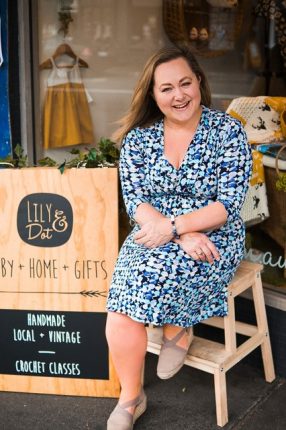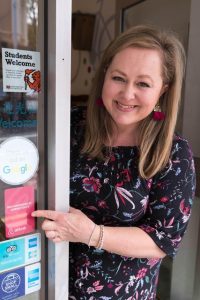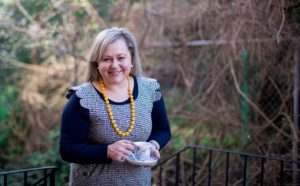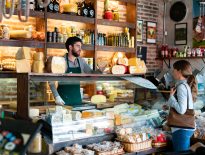
Adapting our strategy saw our business grow through COVID-19

Lily & Dot in Hobart has just celebrated its fifth birthday, having opened its door and its online store in October 2015. The store started as a labour of love for owner Katinka Dineen and has remained true to her original vision.
“Hand-crafted, small-batch, bespoke – all the hipster buzz words we associate with the ‘shop small’ phenomenon – are at the core of Lily & Dot” Katinka explains. “It was never my intent to scale it up in terms of opening a second store in another city, for example.”
“A large part of our business model is our ‘crafternoon’ crochet classes, held twice-weekly over tea and cake at the nearby CWA Shop, which resembles your Nanna’s living room.”
With such a personalised approach and a small team – Katinka works full time and is supported by two casuals – it might seem that the COVID-19 lockdown and social distancing requirements would have seen business disappear, but incredibly Lily & Dot has experienced a boom this year!
Katinka explains how this came about:
“We chose to close during the peak COVID period, despite retail falling within the government’s definition of “essential services,” which we found a little incongruous. While people were being instructed in no uncertain terms to stay home to stay safe, it didn’t sit well with us to keep our physical doors open for a spot of lifestyle gift shopping.”
She continues, “We already had an online store, so we chose to play our part in keeping the community safe by closing our physical doors and ramping up the profile of our online store.”

Image: Airbnb
“We adapted our marketing strategy and met the market with on-point products.”
“By switching to 100% online we were providing contactless service and we committed to free Australia-wide postage, and free daily doorstep deliveries within Greater Hobart.”
“We introduced a new range of “iso” care packages that went through the roof.”
“We didn’t buy any new product lines for these hampers, apart from a locally made essential oil hand sanitiser that was added to a personal care range we already stocked. Rather, we strategically repackaged existing gift lines that aligned with community sentiment. In doing so we attracted new customers and reminded existing customers that we offer more than just new baby gifts.”
And while Hobart and Melbourne have always been the key markets for Lily & Dot, the COVID period saw a surge in gift sales Australia wide.
Katinka explains, “We tapped into the large number of Tasmanians who have interstate friends, family and colleagues. Organic soaps, lavender eye pillows, heat packs, candles and hand creams were gift-boxed and sent all over Australia and beyond.”
“We honed our Facebook and Instagram content to focus on products relevant to people isolated at home – candles were experiencing a national sales boom, along with other gift lines that provided home comfort for ‘cocooning’.”
“Our island mentality really came to the fore: the ‘thinking of you’ theme was a strong motivator with the separation of family and friends; we tapped into virtual baby showers and children’s parties by offering free deliveries – we even came across a drive-through baby shower! And we introduced a card-writing service for people unable to get to the local store to buy a birthday card. I would transcribe their greeting and post it on their behalf.”
While it may seem that this growth came easily, the truth is it required a lot of hard work and long hours.
“I spent three months in my car delivering gift hampers and a lot of time at my local post office! I have no comprehension of what it was like to be at home running out of baking ideas and puzzles to do – I was gift wrapping our puzzles and shipping them to all corners of the country.”
“Our third highest selling product during the three-month peak of COVID in Australia was our Tasmanian devil printed face mask. We came across some terrific Tasmanian-devil printed baby bibs on Instagram, featuring the original illustrations of a local maker who had to close their Salamanca Market stall due to COVID. We purchased a stack that were an instant hit with mainland and local buyers. In doing so we tapped into the surge of island pride that was rising this year.”
“An existing Melbourne customer (and Tassie expat) saw our post and asked if the bib could be adapted into a face mask – and it went a bit crazy from there! At last count we have sold over 600, supporting a local artist who had lost a key income source when the market closed.”
Of course, the COVID-19 lockdown also brought challenges and disappointments for Lily & Dot.
“We had to cancel three months’ worth of pre-paid bookings when social distancing restrictions came in. We considered the online class/tutorial idea but decided against it, as the Lily & Dot class experience is very much more about giving yourself some time out to enjoy the social time and space.”
“Because I teach absolute beginners, it would have been difficult to replicate the small- group dynamic and hands-on learning experiences that the classes provide (not to mention the CWA lemon slice, quite the drawcard!)
“Instead, we recommended YouTube tutorials and rebooked all our classes for post-reopening.”
After such a demanding 2020, what does the future hold for Katinka and Lily & Dot?
“The decision to close our bricks-and-mortar shopfront aligned with our brand values of being community-focussed and it was the best decision we could have made. But undoubtably, my proudest moment so far in with the business was being able to reopen our doors in mid-June following the three-month closure.”

Image: Rosie Hastie
“We work a little differently now”
says Katinka, “Earlier closing times of the physical store enable us to manage our online order fulfilment and logistics within business hours, including local courier deliveries, post office runs and restocking. Our pre-existing ‘click & collect’ service has also had a surge in popularity that has maintained momentum.”
“Our social media promotion of our online store attracted first-time customers; the challenge now is to entice them back and retain them. Creating our own YouTube channel is now on the business plan for next quarter! And we are working with a web developer to enhance our online store features, look and feel. This will require significant investment in the new year, but contactless shopping methods are here to stay.”
“Without doubt we will continue to build our “crafternoon” program – this has engendered a craft community around the store, introducing customers to the classes, and vice versa.”
On the strategic planning front, a key business goal for Lily & Dot is to increase reach to interstate customers via the shopfront and online store. And in time, to attract international visitors as well.
“It’s always been a strategy to pitch the Tasmanian made-ness of Lily & Dot to those tourists who are keen to go beyond the main tourist traps and experience more of the Hobart that locals know.”
Armed with the lessons from the COVID pandemic, and the success that has come about through hard work and creative thinking, Katinka is looking optimistically to the future.
“Lily & Dot has always been ‘bricks and clicks’, but we are spending more time on the “clicks” than we used to. Changes to consumer behaviour and attitudes are here to stay – and one of them is supporting local small business and makers. This also aligns well with Tasmanian brand values.”
And pleasingly for all, it looks like the personalised messages are also here to stay, “these have continued after lockdown, with several repeat customers who are based overseas arranging for a thoughtfully handwritten note for family or friends in Tasmania. This is one of those special touches that large businesses can’t offer – I’m really proud that our small business can deliver a service like this that puts a smile on people’s faces.”
Main image: Mapleseed Photography

